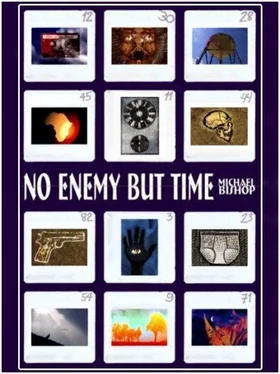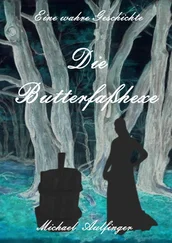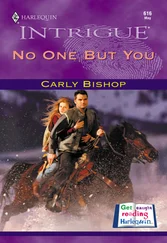She refused to look at me, glancing instead at Helen before staring wistfully out into the darkness of the bush. She was slightly larger and slightly hairier than Fred and Nicole’s A.P.B., probably more than a year old.
“At least you had the sense to steal one that’s old enough to eat solid foods,” I told Helen.
Helen took the australopithecine child out of my arms and set her on the ground between us. Then, embracing me, she patted my back with both hands, all the while gibbering a series of syllables that had little relation to any I had taught her. Their unintelligibility did not obscure their binding import. As surely as if we had conceived this child ourselves, Helen and I were the australopithecine’s mother and father. It was our responsibility to see that she grew into a healthy adult.
“This is crazy,” I protested. “Helen, she’s not a habiline. She’s a kidnapped southern ape. Even if we manage to shepherd her past adolescence, what kind of life do you suppose she’ll have?”
Still patting my back, Helen mumbled a string of incoherent sweet nothings. With foolish-fond eyes she looked down at our daughter, who appeared to be lapsing into an autistic trance.
“Who’s going to mate with her?” I continued. “She’ll be lucky if the Minids tolerate her presence, much less accept her as one of their own. Nor are her own folks going to want to take her back. She’ll be despised by habilis and africanus alike, Helen, just as if she were a half-breed. Can’t you see what folly this is, what potential disaster?”
Helen was having no part of my faintheartedness. She hunkered beside the tiny girl-child and tenderly groomed her head. Now I saw that on her raid against the australopithecines Helen had not totally escaped injury. Blood from a series of claw marks striated her inner arm. And yet she had stolen this child with no worse hurt than that, a feat of such competent derring-do that I could only shake my head.
The look on Helen’s face said that I should tend to the child while she took a few moments to see to her wounds. Awkwardly I knelt beside the little hominid and went nit-picking through her scalp, a courtesy that her trance did not permit her to acknowledge.
On the other side of the water hole Emily awoke, sat up, and looked at us. After yawning sleepily, she rose and ambled around the pond to satisfy her curiosity. Were we real or only a midnight apparition?
Squatting as Helen had, she touched the kidnap victim on the chin. Then, fascinated by the australopithecine’s passivity, she pulled her finger back and stared. Helen and I scarcely dared to breathe—as if Emily’s next decision would spell either life or death for the abducted child.
At last I said, “Her name is Mary.” I looked at Helen. “Is that all right with you? Mary?”
“ Mai mwah ,” Helen said. “My mirror,” I thought, was a reasonable approximation of “Mary.” Let it stand. Let it stand.
“Good. That’s settled.”
Satisfied that Emily intended Mary no harm, Helen left me in charge of the child and disappeared into the night again. When, ten or fifteen minutes later, she returned, she was carrying a good supply of ol duvai , wild sisal, with whose sticky balm she treated the claw marks on her arm. Emily helped her, smoothing Helen’s sparse forearm hairs aside and squeezing the natural anodyne of the wild sisal into her cuts. Why such solicitude? I wondered. Maybe it was the late hour, the presence of the child whose head I was still desultorily searching for lice, or the all-pervasive quiet. Whatever the reason, I too was at peace, my misgivings about adopting the australopithecine routed by an army of fatuous hopes.
* * *
Alfie roused us from sleep by banging his stave repeatedly against the bole of a tree. It was almost dawn.
In clusters on the plain, like cowlless monks at matins, sat the vultures that had settled on the corpse of the hyena impaled by the female rhino and gutted by its own fellows. The other hyena—the one I had shot—had been dragged down to the water’s edge, out of the birds’ reach. Even so, the vultures kept their eyes peeled for an opportunity to move in.
Any troop of self-respecting baboons would have breakfasted before departing, but Alfie, along with Ham and Jomo, moved us out into the veldt with nothing in our stomachs but muddy water and the fluttery sensation that accompanies either doubt or encroaching illness. The idea was to get us going before the arrival of a lion or the return of the hyenas pinned us up for the better part of the morning.
Today Helen marched at the center of our procession, taking Mary with her. Now that she had a child she was indisputably entitled to give up her roles as outrider, sentry, and bodyguard in favor of those as veldtwife, mother, and ward. Dragging her acacia stave behind her like a broken rudder, she carried little Mary on her hip. A weapon in one hand, a baby in the other. If she was confused by the disparate allegiances embodied by these symbols, her heart—at least for now—was with the women. Nor did the women harass or cold-shoulder her for joining them.
Once the Minids had all become aware of her, Mary focused their occasional attention without provoking their hostility. I had expected angry faces, angry gestures, maybe even an assault. Instead, the habilines took turns examining the child, whom they seemed to delight in sniffing and gently poking. Helen allowed the Minids their inspections. If Mary were to survive, they must satisfy their curiosity about the kidnapped child and accept her as one of their own. Without once whimpering or struggling to get away, Mary clung to Helen with wide, terrified eyes, fatalistically enduring her ordeal.
During our march the child overcame some of her fear of the Minids, and on one occasion, when we stopped to rest, she toddled away to join Bonzo, Duchess, and Pebbles, who appeared to be experimentally tormenting a pair of coprid beetles left over from yesterday’s encounter with the chalicotheres. The children did not prevent Mary from taking up with them. In fact, they allowed her to participate in the dismemberment of one of the insects, and both Helen and I looked on dotingly. After that, Mary, for all intents and purposes, was a habiline.
By noon we were in more or less open country, full-fledged savannah, but the mountain—still, I decided, about fifteen miles away—sometimes appeared to retreat from our approach.
A brake on our progress, the children continued to tumble about like puppies and to lolligag over any bit of desiccated matter in the grass. Mary was one of them now, and Helen sometimes edged out of the center of our column as if to renounce motherhood for sentry duty. She hurried back to Mary, though, each time the child showed signs of fatigue or crankiness. Her dedication to our daughter made me pensive and a little resentful. I had liked Helen as a comrade as well as a lover.
Late that afternoon Ham separated from the group and ran gimpily ahead of us to a depression in the grass. He circled this small concavity (which, but for Ham’s strange behavior, I would not have looked at twice), then halted and cautiously circled it in the other direction. He hooted for reinforcements. When the other habiline men arrived, me among them, he lurched forward and yanked a large wedge of sod from the hollowed-out place in the savannah.
A high, perilous hissing sound ensued. I supposed that Ham had uncovered a snake, maybe one of those egg snakes whose ceaselessly coiling bodies and cobralike hoods make your blood turn to ice. But their behavior is all empty bluff, and Babington had taught me not to fear them.
What Ham had found, though, was not an egg snake or a bona fide cobra. Not at all. He had uncovered a litter of cheetah kittens. I counted four of them, elegant little felines with masks for faces and jewels for eyes. In their immature, silver-blue coats, they pressed against one another spitting out their fear and indignation. Their outrage was humorous. Mother was off hunting somewhere, but she would be back soon and we had better scram before she caught us poking around in their crib. Who did we think we were, anyway?
Читать дальше



![Ally Carter - [Gallagher Girls 01] I'd Tell You I Love You But Then I'd Have to Kill You](/books/262179/ally-carter-gallagher-girls-01-i-d-tell-you-i-lo-thumb.webp)








